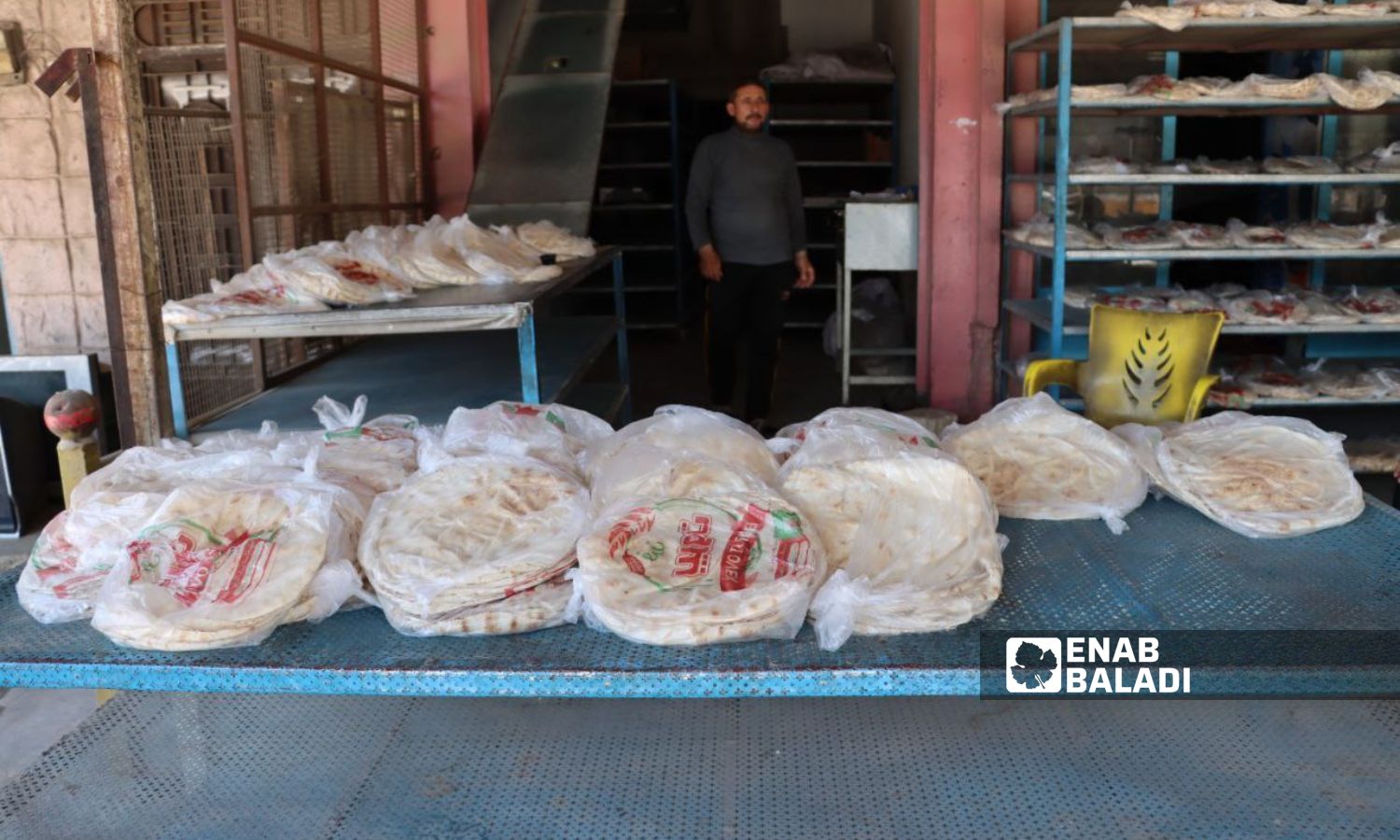



Al-Hasakah – Rita Ahmad
Residents of the village of Mujarjae in the southern countryside of al-Hasakah, where the Autonomous Administration of North and East Syria (AANES) controls, are suffering from a severe shortage of bread since Eid al-Adha. They have only received one batch of flour, and each family’s share from the public bakeries (subsidized bread) is one bundle daily, weighing 1100 grams and containing nine loaves, at a price of 1500 Syrian pounds.
Suleiman Mahmoud, one of the residents of Mujarjae village, told Enab Baladi that the bread crisis is not new. For several months, bread has been distributed intermittently, being delivered to his home through the “commune” (chief of the village) once every three days over the past months.
He added that since the day before Eid al-Adha, bread has been completely cut off from the village, causing its price to rise to 10,000 Syrian pounds per bundle, a price most residents cannot afford.
According to Mahmoud, bread is available in shops at the unsubsidized price daily, but it is cut off from the bakeries and communes at the subsidized price.
He added that women in the village used to rely on tandoor bread, but they face difficulties in preparing bread in their homes due to a shortage of flour and firewood, with the price of a flour sack (50 kilograms) reaching more than 400,000 Syrian pounds.
Residents of many villages and towns across the southern countryside of al-Hasakah governorate suffer from a shortage of bread, with the price of a bread bundle varying from one village to another due to this shortage.
In the village of Makhrum, a bundle costs 2000 Syrian pounds, while in the village of Khurshna it is sold for 1500 Syrian pounds for subsidized bread. The unsubsidized bread is sold at prices ranging between 8,000 and 10,000 Syrian pounds.
Similar to the villages and towns in southern al-Hasakah, several neighborhoods in the city of al-Hasakah, such as Hawsh al-Baa’r and Ghwairan, suffer from the same problem, as bread is intermittently cut off, and prices vary in the same way.
Khawla al-Obaidi, displaced from Deir Ezzor and residing in Ghwairan neighborhood, told Enab Baladi that bread is available in the neighborhood only three days a week, and the quantity is not enough for her family of eight, so she is forced to buy bread at 6,000 Syrian pounds from the neighborhood markets.
On her part, Nuha Ghaidan, a resident of Kallasa neighborhood in al-Hasakah, said that the Dulab Awisi bakery, which used to supply their neighborhood with bread, stopped working before Eid al-Adha and has not resumed its activity until now.
She told Enab Baladi that the authorities’ role in resolving these problems is absent, noting that her family is forced daily to buy bread from the market at high prices.
She explained that the Omran bakery in the neighborhood sells a bundle of bread containing 14 pieces for 14,000 Syrian pounds, which places a heavy financial burden on them.
On June 25, the Economic Authority of the Autonomous Administration issued a series of instructions related to mills, calling for the upgrading of mills and the application of the agreed-upon measures with the Agricultural and Economic Authorities in the bread-making process.
It emphasized not to receive third and fourth-grade wheat by mills unless it is sifted according to the criteria set by the Agricultural Authority, stressing the importance of enhancing the role of monitoring committees and granting them greater powers in the bread-making process, especially in economic bodies.
The Economic Authority suggested forming a special control unit for bakeries, aimed at regulating violations and adhering to the regulations and rules specific to bakeries.
The authority directed the reallocation of flour quotas to the bakeries, taking into account the population numbers and geographic distribution, and decided to activate the Executive Council’s decision that states the mills should be affiliated with the Economic Authority of the Autonomous Administration. It also announced the formation of committees to reassess the technical conditions and health standards of bakeries, taking measures to close non-compliant bakeries and revoke their licenses.
On May 18, the Autonomous Administration raised the price of the bread bundle by 500 Syrian pounds after increasing the price of flour sold from mills to bakeries. The price per ton of flour became 800,000 Syrian pounds across northeastern Syria. The Agricultural and Economic Authorities stated in a notice that social development companies, mills, and bakeries were instructed to adopt the new pricing for flour and bread.
According to AANES’ announcement, the price of the bread bundle has become 1400 Syrian pounds at the authorized dealer and 1500 Syrian pounds for the consumer, after previously being 900 pounds from the bakeries and 1000 pounds through the dealers.
if you think the article contain wrong information or you have additional details Send Correction